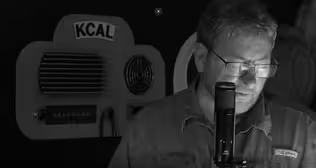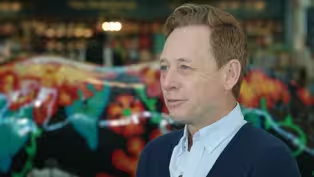
Bucking the Trend: Kentucky’s Young Farmers
Clip: Season 30 Episode 13 | 8m 47sVideo has Closed Captions
Two Western Kentucky farmers are bucking the trend - choosing agriculture over city life.
Since the 1970's, the average age of the American farmer has continued to rise. The Department of Agriculture’s 2022 farm census puts that age just north of 58 years old. But what about the folks who decided to stay? What about the young farmers who are bucking this trend? We caught up with two young farmers in western Kentucky and their stories offer fresh insight into the future of farming.
Problems playing video? | Closed Captioning Feedback
Problems playing video? | Closed Captioning Feedback
Kentucky Life is a local public television program presented by KET
You give every Kentuckian the opportunity to explore new ideas and new worlds through KET. Visit the Kentucky Life website.

Bucking the Trend: Kentucky’s Young Farmers
Clip: Season 30 Episode 13 | 8m 47sVideo has Closed Captions
Since the 1970's, the average age of the American farmer has continued to rise. The Department of Agriculture’s 2022 farm census puts that age just north of 58 years old. But what about the folks who decided to stay? What about the young farmers who are bucking this trend? We caught up with two young farmers in western Kentucky and their stories offer fresh insight into the future of farming.
Problems playing video? | Closed Captioning Feedback
How to Watch Kentucky Life
Kentucky Life is available to stream on pbs.org and the free PBS App, available on iPhone, Apple TV, Android TV, Android smartphones, Amazon Fire TV, Amazon Fire Tablet, Roku, Samsung Smart TV, and Vizio.
Providing Support for PBS.org
Learn Moreabout PBS online sponsorshipBut first, since the 1970s, the average age of the American farmer has continued to rise.
The Department of Agriculture's 2022 farm census puts that age just north of 58 years old.
But what about the folks who decided to stay on the farm?
What about the young farmers who are bucking this trend?
We caught up with two of them in Western Kentucky, and their stories offer fresh insights into the future of farming.
[music playing] [music playing] The Western Kentucky counties of Muhlenberg and Webster have a long history of farming and coal mining.
This unique environment creates its own set of challenges for young people who want to get involved with agriculture.
So, the challenges facing farmers here in Muhlenberg County, and specifically young farmers, is land availability.
Muhlenberg County is actually, historically, it's a mining county.
And so, there's been a lot of mining that's been done here.
And so, that's taken a lot of resources out of production.
There are so many things There are so many things that are out of your control when you're farming.
Almost everything, really, is out of your control.
We cannot control the weather.
We can't control the cost of the inputs.
We can't control the price of the equipment.
And the list goes on and on and on.
A lot of people could be dissuaded from getting in the industry.
You think, “Why are these people doing this?” They're doing it because they love it.
Whenever it's in the teens in January, and you're Whenever it's in the teens in January, and you're feeding cattle or, you know, if it's May and you've got 100 acres of hay down, and it's fixing to rain, whenever it's the most pressure and the most tough, that's when I feel like I thrive, and I love it the best.
I really enjoy watching plants sprout from seed.
So, the seeding process is tedious and sometimes monotonous, but it's one of my favorite parts to see those little seedlings pop out of the soil.
[music playing] A lot of our younger farmers, they're able to farm because they have a way in.
Their father or their uncle or their grandfather has farmed, and they're able to buy into that farm.
My father was a coal miner.
My grandfather was a coal miner.
I'm kind of the first one to not be, but my father always had cattle.
We had a large deal of hogs at one time.
So, I mean, you know, this is how I grew up.
This is home to me.
For me, farming runs in my blood.
So, I come from a long history of farmers.
I'm actually the sixth generation to call this place home.
It's meant a lot to me.
I think it's shaped me into the person who I am today.
[music playing] When I was seven or eight years old, I bought with my own money, two little feeder pigs.
I think I paid $40 for both of them.
So, from a very young age, I learned how to, you know, not only care for the animals but also watch them, you know, and kind of see what things they need, you know, and what it took to make them grow and turn into money.
I first started with the greenhousing in middle school.
I took a particular interest in home gardening and raising vegetable slips.
And it was about that time I built my first greenhouse.
It was a small 6x8 foot PVC frame.
I found success with that.
And so, from then, I kind of looked at this as more of a business venture.
And I figured, I thought I might, could make some money at this kind of thing.
You know, in the past, tobacco was the way, that was the entrance for young farmers to get in into farming or into agriculture, the industry as a whole.
And we just don't have a lot of that anymore.
I've been able to see these farms diversify and grow because you've got to do something to be able to expand, to bring another generation into that.
So, we were just looking another avenue to produce a little income.
You know, not everybody can afford or has the freezer space or what have you to buy a whole beef.
You know, somebody may just want to come buy five pounds of ground beef from you and know where their food is coming from.
In addition to selling freezer beef, Russell has teamed up with his Cooperative Extension Agent to make his operation as efficient and profitable as possible.
We have research-based information that we can share with them, give to them, and help them be able to make better-informed decisions.
The program that we have been doing with UK Ag is back to basics.
We're just coming back to the basic, you know, fundamentals of how to make a cattle operation be successful.
Sometimes you get into the habit of doing things just because grand/dad did them or what have you.
But, you know, so you've got to be open to new ideas.
But then, you know, you've got to come back to just a basic formula of what's going to make this keep going.
And one of the most essential keys to this formula is simpler than you might think.
It's a family operation.
And he has the support of his wife.
His kids are out there.
His wife is right there alongside him, and they are both in this together.
Without her, I wouldn't be able to do this.
She comes home, and then she helps on the farm.
I've got times and times that I will call her and say, "Hey, you know, I know you're dressed up, but cows are out, I need help.” You know, and she comes running.
Building a successful business means that you have to connect with your customers.
And sometimes that means getting creative.
It's sometimes a challenge getting customers to find us because we're not on, you know, the beaten path.
And so, we participate in a local hay bale creation contest.
This year we've done a cow.
It's a Daisy the cow.
We have a lot of fun with it.
It's always good when you can win too, so.
And Jacob keeps his customers coming back with innovative products and engaging activities.
One of our specialties here at Abbott Acres is succulents and cacti varieties.
And so, we'll have folks come in, and they'll create a succulent dish garden that they can take home with them.
The popularity of these value-added experiences speaks to a broader issue in our society.
You know, when you think about the percentage of people in the country that are farmers, it's a pretty minute number.
And so, a lot of people have been removed from that agrarian society, and they really don't know much about it.
It feels to me like Jacob really wants to teach people about the industry.
We're always looking for opportunities to bring new customers into the business.
So, we offer classes but also offer our customers new experiences.
I think that could actually turn the tide for agriculture where that lots of people could want to come in and say, "I want to learn more about this."
You know, whether it's horticulture, whether it's livestock, grain, what have you.
Agritourism has become a billion-dollar-a-year industry because people want to reconnect with the land.
And that connection is what keeps our young farmers at home.
It's kind of hard to explain, but yet at the same time, if you grew up in a farm family, it's a way of life for you.
We just made the decision that this lifestyle of being able to be stewards of the ground and the animals that God has given us and take care of them and not only do that but raise our children doing it.
You know, you realize this lifestyle is why I'm doing this.
This is, I mean, this is more than worth it.
[music playing] Family is a big deal for me.
I couldn't do what I do without my family.
They're always very supportive of what I do and my crazy ideas.
But yeah, they're always willing to pitch in and help me whenever I need them.
[music playing] So, Angeline and I have two sons.
We have Rollins, he's nine, and then we have River, he's six.
And they are my right-hand men.
I mean, if they're not at school, chances are they're out here with me.
It's my dream to raise my own family here on the farm and pass the baton onto my kids.
And I'm excited about what the future holds for me.
My only goal with all of this is honestly, whenever I'm an old man, I want to look back and say, you know, I was able to build something for my children.
[music playing]
Video has Closed Captions
Clip: S30 Ep13 | 6m 44s | KCAL Old Time Radio recreates radio shows from the 1940s and 50s and performs them live. (6m 44s)
Poets of Kentucky: Silas House
Video has Closed Captions
Clip: S30 Ep13 | 7m 4s | Current Kentucky Poet Laureate Silas House (7m 4s)
Providing Support for PBS.org
Learn Moreabout PBS online sponsorshipSupport for PBS provided by:
Kentucky Life is a local public television program presented by KET
You give every Kentuckian the opportunity to explore new ideas and new worlds through KET. Visit the Kentucky Life website.















